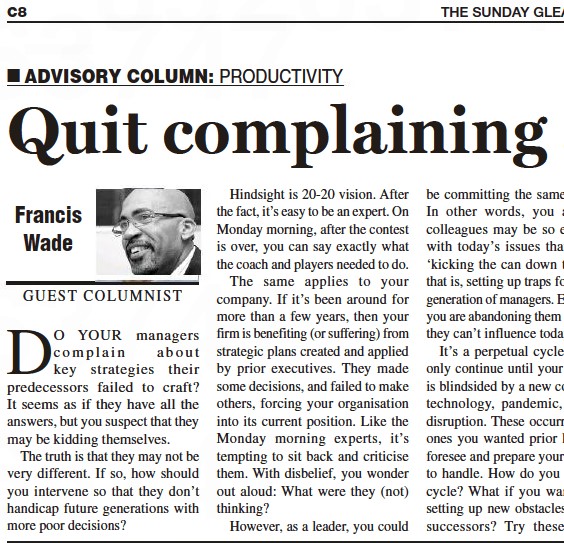Do your managers complain about key strategies their predecessors failed to craft? It seems as if they have all the answers, but you suspect that they may be kidding themselves. The truth is, they may not be very different. If so, how should you intervene so they don’t handicap future generations with more poor decisions?
Hindsight is 20-20 vision. After the fact, it’s easy to be an expert. On Monday morning, after the contest is over, you can say exactly what the coach and players needed to do.
The same applies to your company. If it’s been around for more than a few years, then your firm is benefitting (or suffering) from strategic plans created and applied by prior executives. They made some decisions (and failed to make others), forcing your organization into its current position. Like the Monday morning experts, it’s tempting to sit back and criticise them. With disbelief, you wonder out aloud: “What were they (not) thinking?”
However, as a leader, you could be committing the same mistake. In other words, you and your colleagues may be so engrossed with today’s issues that you are “kicking the can down the road” i.e. setting up traps for the next generation of managers. Essentially, you are abandoning them to a future they can’t influence today.
It’s a perpetual cycle which will only continue until your company is blindsided by a new competitor, technology, pandemic or other disruption. These occurrences are ones you wanted prior leaders to foresee, and prepare your company to handle. How do you break the cycle? What if you want to quit setting up new obstacles for your successors? Try these thought experiments, preferably conducted during a leadership retreat.
1) Imagine Your Organization Doesn’t Exist
In this thought experiment, ask yourself: “What if our organization didn’t exist?”
Look to the future and predict what would happen in your industry in regards to the products and services you deliver. What would customers and stakeholders come to expect as the norm? From whom? What new technologies or market realities would have an outsized influence?
Understand that your answers rely on present developments, maturing trends, and items becoming obsolete. In this experiment, you have no control – you can only observe.
The only real question to ask today is: What is your current relationship to these external forces? How are you preparing your company to deal with them? Unfortunately, many executives do little more than complain: “Someone should do something before it’s too late.” But they fail to act, only becoming victims. Don’t make this mistake.
2) Fast-Forward Far-Away Developments
Even if you can clearly discern market or technology trends, some managers won’t. They’ll pretend these threats can be ignored. Their inertia makes the company passive.
In a strategic planning exercise several years ago, we asked a leadership team: “When will a majority of Jamaicans prefer to use online banking?” After a long discussion, the group came to agreement: “2030.”
In today’s world, in light of COVID, we can see they were far off the mark. However, by back casting from 2030, they created a feasible course of action. As such, when the pandemic broke out, they could revisit their plan, have a laugh at their assumptions, and fast-forward their transformation. Instead of going into a panic, they made a tweak.
As you can imagine, future managers look back at this kind of exercise with gratitude. Even though it was inaccurate, it wasn’t incorrect. The same might apply to your industry and company with respect to inevitable changes that may arrive far more quickly than imagined.
3) Think in Terms of a Market Winner
Finally, imagine if all the competitors in the world were to disappear, leaving a single provider. Ask the retreat: “What did this team do to be the last one standing, serving customers, while others failed?”
Chances are, this is probably the company that invested early in some critical capability that others didn’t recognize.
Bring that thinking to your situation today. How do you ensure that you become more like Netflix/Apple/Fuji rather than their failed counterparts: Blockbuster/Nokia/Kodak? Can you stop postponing long-term decisions which guarantee your failure?
Arguably, there are few companies which arrived at their dominant position by accident. For example, Grace Kennedy’s competitors in the mid-1990s are no longer major players in their industries. Why? GK’s 25-year plan helped it surge ahead, via far-sighted moves some thought were foolish.
Don’t fall into that trap and inadvertently make your company obsolete. Instead, let future generations be proud of your decisions and willingness to set ego aside for the greater good. They may even thank you for your courage.
Francis Wade is the author of Perfect Time-Based Productivity, a keynote speaker and a management consultant. To search his prior columns on productivity, strategy, engagement and business processes, send email to columns@fwconsulting.com.

